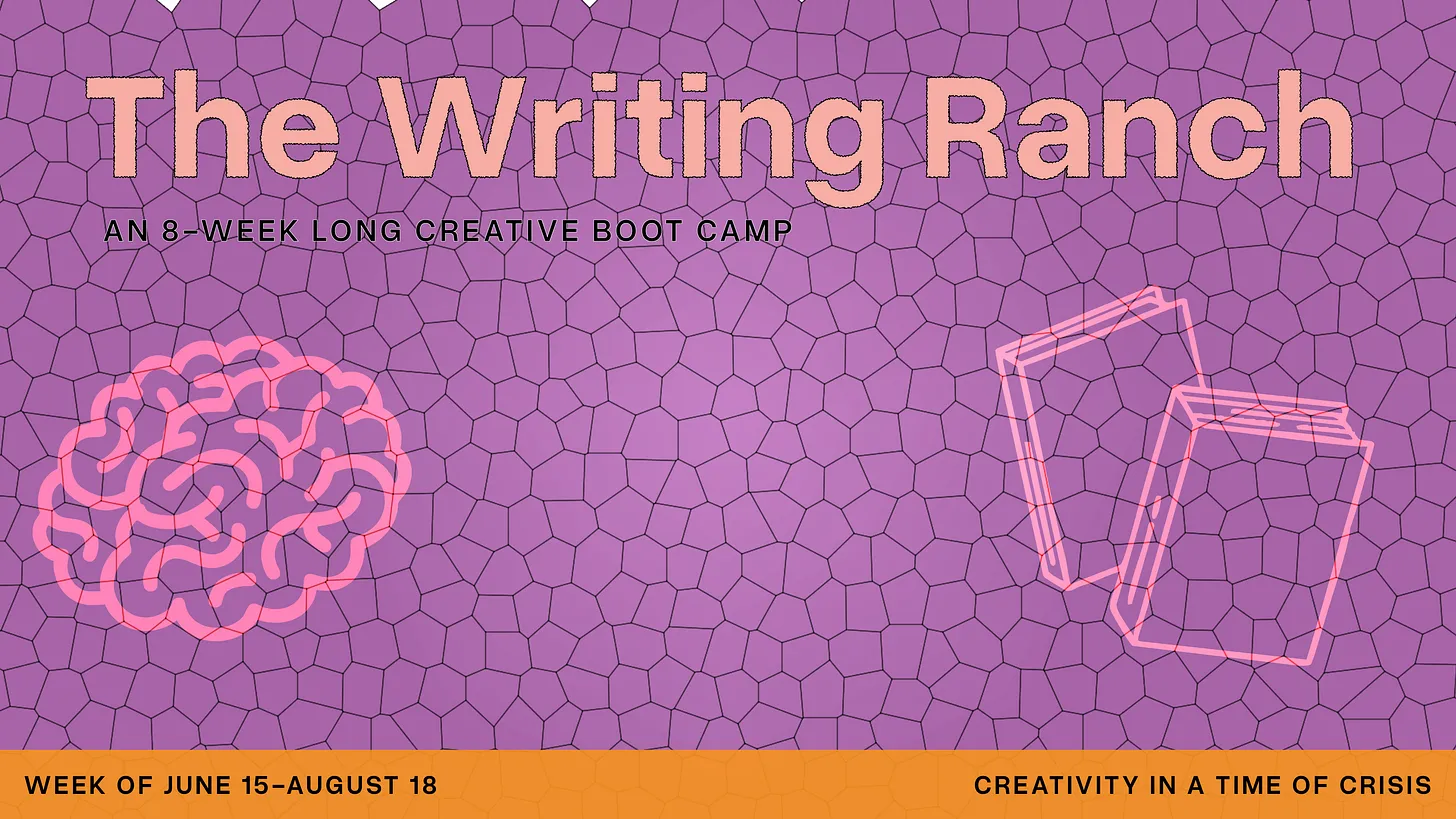Q&A with Author Cindy Schweich Handler
Plus, info on The Writing Ranch, our 8-week, summer creativity bootcamp, inspired by Julia Cameron's The Artist's Way. Join us!
Dear Writers,
The cherry blossoms, forsythia, and tulips are blooming. Everything feels beautiful and fragrant and filled with possibility, at least in Central Park, though the rest of the world feels like it’s spinning off its axis. We’re trying to focus on what’s possible and positive here, so wishing you a happy Passover and Easter, if you celebrate, and hoping that magnificent flowers are blooming near you.
In other reasons to celebrate, my friend and writing partner, Cindy Schweich Handler, has a book, A German Jew's Triumph: Fritz Oppenheimer and the Denazification of Germany, out this week. The book tells the true story of Fritz Oppenheimer, a Prussian soldier and lawyer who fled the Nazis, joined the U.S. Army at 45, and played a crucial role in shaping post-war justice.
Is there anything more delightful than sharing writing with someone whose work you admire? That’s how I feel about Cindy. We used to work together at North Jersey Media (now USA Network), where we both edited local magazines. For the past eight plus years, we’ve been trading writing and talking about it, first in coffee shops and now via Zoom.
Cindy is a native of St. Louis, Missouri whose work has appeared in The New York Times, The Washington Post, Newsweek, Redbook, Huffington Post and a host of other national publications; she has written about subject matter contained in A German Jew’s Triumph: Fritz Oppenheimer and the Denazification of Germany in The Washington Post and Northjersey.com. She is currently a writer for The USA Today Network in northern New Jersey whose features have appeared regularly in The Record newspaper, online at Northjersey.com and in Gannett-owned newspapers throughout the country. Formerly, she was editor-in-chief of multiple USAT Network local magazines. She is a graduate of Northwestern’s Medill School of Journalism. Handler has three grown children and lives in Montclair, New Jersey with her husband Harry and Leo, their senior goldendoodle.
Almost every day, I thank the universe that I know Cindy. We offer each other praise, constructive criticism and reasons to keep writing. And we make each other laugh, just as important as a waiting audience and pending deadline. Cindy’s new book is gripping and brilliant. She’ll be speaking at the Montclair Literary Festival, Saturday, May 3. Read our Q&A below.
What is your writing process?
First, I set a goal for the day. It can be modest—“Find a way into this chapter/article/essay,” for example— but the day shouldn’t end without my having met it. To do this, I then have to follow what I believe is the most important maxim for creative people: “Get your butt in your chair and keep it there.”
For me, getting the beginning right is the hardest part of a project. But it’s also the most clarifying; it’s like finding the right door to lead you to the path you want to take. Most of the time, that involves trying a lot of doors that don’t work first.
The next day, I comb through whatever I’ve written the day before to edit it with fresh eyes, and to refamiliarize myself with what I was thinking.
Do you write by hand? Type from notes? Develop an outline?
I always type on my laptop, whether I’m writing a manuscript or typing notes and reminders to myself. (In fact, sometimes when I have a hard time getting started, I type stream-of-consciousness thoughts about what I need to do, a la “This character needs to be in a situation where she realizes she’s stronger than she previously thought…”)
I always make an outline, but I think of it as a map of a forest with a lot of trails in it: You need the map to get started, but you don’t know what you’re going to discover on the way, and you won’t get from beginning to end in the way you originally thought you would. If you did, as many others have pointed out, it would be a boring exercise. It’s the journey of discovery that’s fun.
If you’re writing a book, did you first come up with an outline or table of contents?
I wrote a book that will be published this spring, and am starting to write another. I need an outline, but think a table of contents would be unnecessarily specific (at least for me).
Do you have a regular writing practice? If so, describe it. (For instance, do you write first thing in the morning, for at least one hour? Commit to writing 1,000 words a day? Journal for 15 minutes and see what happens? Write late at night, after everyone has gone to bed? )
I find that I write the best in the morning after a good night’s sleep. Under those conditions, I’ll try to write for several hours without interruption. (Easy for me to say because my kids are grown and I retired from a newsroom last year. When schedules are challenging, of course, writing works best whenever you can fit it in!)
But also, because I worked in that newsroom for many years, I know that the “butt in chair” rule often has to extend until you’ve met your deadline (or the goal you’ve set for yourself).
Where do you write? (Bed, desk, kitchen table, coffee shop, etc.) Standing up? Sitting down?
I like to write while seated at my desk on the laptop in my home study. I should add, though, that writing while traveling in a new setting can have a liberating effect on the creative process. I think this is because the exotic setting makes you see yourself in more of an adventurous context, so you’re more willing to take risks with different approaches and ideas.
What books, stories or essays have you read recently that have inspired you?
The best books I’ve read on writing are “On Writing” by Stephen King and “Bird by Bird” by Anne Lamott. The former describes good writing as the process in which thoughts are magically transferred from the author’s mind to the reader’s. The latter advises writers to think of their work as a marathon, not a sprint, and to focus on each day’s small step toward the finish line.
Reading authors you admire for their language, plotting, vivid characters, etc., is inspirational, too.
Do you read actual books, read on Kindle, read on Audible, or borrow from the library?
I love perusing bookstores, but most of the time, I read books on my iPad. The books I read are backlit so I can read them in the dark, and they’re searchable, so I can remind myself of who a character is or about a plot twist I forgot. Also, I can take my library with me wherever I go.
Which writers do you turn to for inspiration?
I love writers who make me think “She/he must have had so much fun writing this.” That’s super subjective, of course, but for me, a few of these include Zadie Smith (the plotting, the language!); Hilary Mantel (just the right amount of perfect details); Sigrid Nunez (her writing feels like you’re walking around in her mind); and Meg Wolitzer (relatable, funny characters). Ian McEwan writes so confidently and prolifically, it’s nice to know that’s even possible.
If you have an agent, how did you find this person? Or how did this person find you?
My agent sold a friend of mine’s book, and my friend connected us. But I actually found the press that’s publishing my book, so you never know. Publisher’s Marketplace is a good place to look for an agent because you can search for “dealmakers” who have sold similar books, and would therefore know how to sell yours.
If you have had a story, essay, or book published recently, how many drafts did you revise before you finally submitted it? How many hours/months/years (roughly) did you spend on it?
The story of my book, “A German Jew’s Triumph: Fritz Oppenheimer and the Denazification of Germany,” and its journey to publication is one of those “So never give up!” sagas. To make a really long story short, there were seven years between my first note-taking and sale of the (fully written) book. I was working on weekdays and only wrote on weekends and holidays, but still… I’ve lost count of the number of drafts I wrote. With each round of rejections, though, I thought “I can’t imagine not getting this book published, however long it takes.” Incorporating feedback and persisting paid off.
What are you working on now?
My vibrant father passed away a year ago from Alzheimer’s Disease; he had a great life and a bad death. I’m in the earliest stages of writing a half-memoir, half-how-to exploration of how to have a better death than he had when dementia runs in the family. He was a very funny, warm man, so my goal is for readers to find it relatable without being bummed out by the subject.
Rabbi Lisa Greene, Neither Here Nor…Where? A Pesach Reflection (The Wisdom Daily)
Taffy Brodesser-Akner, The Holocaust Story I Said I Wouldn’t Write (nonfiction, NYT)
Melissa Febos, My Face (nonfiction, Yale Review)
Robin Wilkey Gregory, Killing Time (fiction, Gemini Magazine)
Elizabeth Grey, To the Mother-to-Be at the Diner (nonfiction, Off Assignment)
Colm Tóibín, Five Bridges (fiction, The New Yorker); Colm Tóibín on the Undocumented Irish and Writing in Real Time: Q&A with Deborah Treisman
Welcome to Sweet Lab’s Writing Ranch— your return to creativity! Join us this summer as we push our creative boundaries in this 8-week virtual workshop. Class starts the week of June 16 and runs eight weeks through the week of August 18. We’ll meet 5-7 p.m. ET on Monday and/or Tuesday nights.
This course is for you if:
You want to tap into your “flow,” that well of creativity that is still full but it’s dark outside and you’re not sure where to find it.
You want to commit yourself to starting something new and finishing what you started.
You want to recover a sense of safety, identity, power, integrity, possibility, abundance, connection, strength, compassion, self-protection, autonomy and faith.
You want line edits and written feedback on 40 pages of work.
We’ll meet weekly via Zoom and use Julia Cameron’s The Artist’s Way: A Spiritual Path to Higher Creativity as our go-to inspiration and writing bible. We’ll also dip into Twyla Tharp’s The Creative Habit: Learn It and Use It For Life, Natalie Goldberg’s Writing Down the Bones: Freeing the Writer Within, Anne Lamott’s Bird by Bird: Some Instructions on Writing and Life, The Letters of Virginia Woolf, Volume 3, and Joyce Carole Oates’ Master Class: The Art of the Short Story.
We’ll explore the following topics over 8 weeks:
Week 1: Recovering a Sense of Safety
Week 2: Recovering a Sense of Identity
Week 3: Recovering a Sense of Power
Week 4: Recovering a Sense of Integrity
Week 5: Recovering a Sense of Possibility
Week 6: Recovering a Sense of Abundance
Week 7: Recovering a Sense of Connection
Week 8: Recovering a Sense of Strength
We live in times of unprecedented stress and confusion. Many of us are marching, protesting, making phone calls, writing postcards, and biting our fingernails down to the nubs. But what we have the most control over is our writing life. Let’s write our way through it.








